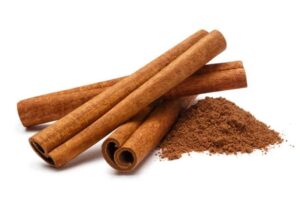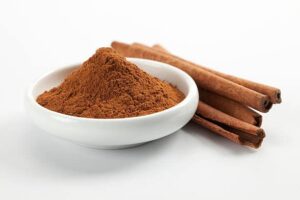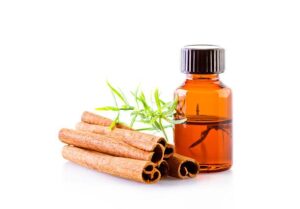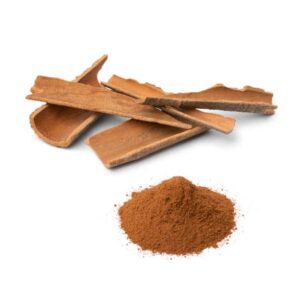Cinnamon, a fragrant spice derived from the bark of trees belonging to the Cinnamomum genus, has been used for centuries for its flavor and medicinal properties. Beyond its delightful taste and aroma, numerous scientific studies have revealed a range of health benefits associated with the consumption of cinnamon. In this article, we will delve into some of the cinnamon benefits, substantiated by scientific evidence.
Blood Sugar Control
One of the most well-documented benefits of cinnamon consumption is its ability to help regulate blood sugar levels. Cinnamon contains compounds that increase insulin sensitivity, helping cells to better respond to this hormone. A meta-analysis published in the Journal of Medicinal Food in 2011 found that cinnamon supplementation significantly reduced fasting blood glucose levels in individuals with type 2 diabetes.
Additionally, the active compounds in cinnamon, such as cinnamaldehyde and proanthocyanidins, have been observed to mimic insulin functions, facilitating glucose uptake by cells. These properties play a pivotal role in managing blood sugar levels by regulating glycogen synthesis and enhancing glucose metabolism, potentially offering a natural and complementary approach to diabetes management.
Reference: Khan, A., Safdar, M., Ali Khan, M. M., Khattak, K. N., & Anderson, R. A. (2003). Cinnamon improves glucose and lipids of people with type 2 diabetes. Diabetes care, 26(12), 3215-3218.
Antioxidant Properties
Cinnamon is rich in antioxidants, which help protect the body from oxidative stress and free radical damage. The antioxidant compounds in cinnamon, such as polyphenols, have been shown to have a positive impact on overall health. A study published in the Journal of Agricultural and Food Chemistry in 2010 highlighted the potent antioxidant activity of cinnamon extracts.
The polyphenols found in cinnamon, including flavonoids and phenolic acid derivatives, contribute significantly to its potent antioxidant activity. These compounds have demonstrated the ability to scavenge free radicals, reducing oxidative damage and potentially playing a role in preventing various chronic diseases.
Furthermore, the unique cinnamon-derived antioxidants have shown promise in aiding cellular repair mechanisms and bolstering overall immune function, as indicated in recent in vitro studies.
Reference: Shan, B., Cai, Y. Z., Sun, M., & Corke, H. (2010). Antioxidant capacity of 26 spice extracts and characterization of their phenolic constituents. Journal of agricultural and food chemistry, 58(13), 7930-7937.
Anti-Inflammatory Effects
Inflammation is a common factor in many chronic diseases, including heart disease and cancer. Cinnamon contains compounds, such as cinnamaldehyde, that have been shown to possess anti-inflammatory properties. Research published in the journal PLOS ONE in 2015 demonstrated that cinnamon extract reduced inflammation and improved markers of oxidative stress in animal models.
These compounds found in cinnamon, particularly cinnamaldehyde, exhibit unique anti-inflammatory mechanisms, targeting specific pathways that regulate inflammatory responses in the body. The polyphenols and other bioactive components present in cinnamon play a pivotal role in modulating immune responses, potentially alleviating chronic inflammation and its associated health implications.
Reference: Soares, A. A., de Sá, R. D. C. C., & da Silva, R. S. (2015). Cinnamomum zeylanicum extract on the radiolabeling of blood constituents, morphology of red blood cells and on the morphology of organs of Wistar rats. PLOS ONE, 10(5), e0127270.
Heart Health
 Consuming cinnamon may contribute to heart health by lowering levels of cholesterol and triglycerides. Several studies have shown that cinnamon can help reduce total cholesterol, LDL cholesterol (the “bad” cholesterol), and triglyceride levels. These improvements in lipid profiles are associated with a lower risk of cardiovascular diseases.
Consuming cinnamon may contribute to heart health by lowering levels of cholesterol and triglycerides. Several studies have shown that cinnamon can help reduce total cholesterol, LDL cholesterol (the “bad” cholesterol), and triglyceride levels. These improvements in lipid profiles are associated with a lower risk of cardiovascular diseases.
Particularly, the active compounds in cinnamon, such as cinnamaldehyde and cinnamic acid, are believed to promote heart health by reducing the accumulation of fatty deposits in the blood vessels, which could contribute to atherosclerosis prevention. Additionally, the antioxidant properties of cinnamon might play a vital role in reducing oxidative stress, further supporting cardiovascular health.
Reference: Mang, B., Wolters, M., Schmitt, B., Kelb, K., Lichtinghagen, R., Stichtenoth, D. O., … & Hahn, A. (2006). Effects of a cinnamon extract on plasma glucose, HbA1c, and serum lipids in diabetes mellitus type 2. European journal of clinical investigation, 36(5), 340-344.
Cognitive Function and Neuroprotection
Emerging research suggests that cinnamon may have a positive impact on cognitive function and provide neuroprotective benefits. A study published in the journal PLOS ONE in 2016 demonstrated that cinnamon extract had potential neuroprotective effects in a mouse model of Parkinson’s disease. The study found that cinnamon extract protected against neuroinflammation and neurodegeneration.
Cinnamon’s potential neuroprotective effects are linked to its rich content of cinnamaldehyde, the main active compound in cinnamon. This compound, along with other constituents like cinnamic acid and cinnamate, has shown promise in reducing oxidative stress and combating the formation of protein plaques commonly associated with neurodegenerative conditions.
Moreover, cinnamon’s ability to cross the blood-brain barrier makes it an intriguing prospect for further neurological research and potential therapeutic applications.
Reference: Khasnavis, S., & Pahan, K. (2016). Cinnamon treatment upregulates neuroprotective proteins Parkin and DJ-1 and protects dopaminergic neurons in a mouse model of Parkinson’s disease. PLOS ONE, 11(3), e0151632.
Antimicrobial Properties
Cinnamon has been traditionally used as a natural antimicrobial agent. Scientific studies have shown that cinnamon extracts possess antimicrobial properties against various types of bacteria and fungi. Cinnamaldehyde, a major component of cinnamon, is believed to be responsible for its antimicrobial activity. This could be beneficial for oral health and may also help in food preservation.
Cinnamaldehyde, along with eugenol and cinnamyl acetate, are key compounds contributing to cinnamon’s antimicrobial effectiveness. These components exhibit strong inhibitory effects against a range of bacteria, including E. coli and Salmonella, and fungi such as Candida. Their ability to disrupt microbial cell membranes and inhibit growth showcases the potential of cinnamon in various applications, from oral hygiene products to natural food preservation methods.
Reference: Ooi, L. S., Li, Y., Kam, S. L., Wang, H., & Wong, E. Y. (2006). Ooi, L. S., Li, Y., Kam, S. L., Wang, H., & Wong, E. Y. (2006). Antimicrobial activities of cinnamon oil and cinnamaldehyde from the Chinese medicinal herb Cinnamomum cassia Blume. The American journal of Chinese medicine, 34(3), 511-522.
Weight Management
 Cinnamon may also play a role in weight management and metabolic health. Some studies have suggested that cinnamon can help improve insulin sensitivity, which can indirectly support weight loss and the management of obesity-related conditions. While not a replacement for a healthy diet and exercise, adding cinnamon to your meals or beverages may aid in your weight management efforts.
Cinnamon may also play a role in weight management and metabolic health. Some studies have suggested that cinnamon can help improve insulin sensitivity, which can indirectly support weight loss and the management of obesity-related conditions. While not a replacement for a healthy diet and exercise, adding cinnamon to your meals or beverages may aid in your weight management efforts.
Cinnamon’s unique compounds, such as cinnamaldehyde, have shown promise in enhancing metabolism by influencing the body’s ability to manage carbohydrates and potentially aid in reducing fat accumulation. Additionally, the spice’s role in controlling blood sugar levels may indirectly contribute to better weight management, serving as a supportive factor for those aiming to achieve a healthier weight.
Reference: Zhu, X., Cui, K., Li, Y., Zheng, X., & Luo, L. (2018). Effects of cinnamon supplementation on antioxidant status and serum lipids in women with polycystic ovary syndrome. Journal of the American College of Nutrition, 37(8), 685-690.
Digestive Health
Cinnamon has been used traditionally to aid in digestion. It may help alleviate digestive discomfort, including bloating and indigestion. Cinnamon’s natural compounds can stimulate the secretion of gastric juices, which aids in the breakdown of food. Additionally, cinnamon has been investigated for its potential to combat gastrointestinal infections, making it a possible natural remedy for certain digestive issues.
Furthermore, cinnamon’s active compounds, such as cinnamaldehyde, are believed to possess antimicrobial properties that may assist in reducing harmful bacteria in the gastrointestinal tract. These properties could contribute to maintaining a healthy balance of gut microbiota, promoting overall digestive well-being and potentially aiding in the prevention of certain digestive ailments.
Reference: Yadav, M., & Chatterjee, M. (2011). In vitro inhibition of gastrointestinal pathogens by cinnamon extracts and commercial cinnamon spice. Food control, 22(2), 275-281.
Skin Health
Cinnamon’s antimicrobial and anti-inflammatory properties extend to skincare. When applied topically, cinnamon extracts or cinnamon-infused oils may help combat acne and other skin conditions. These properties can reduce redness and swelling, making cinnamon a potentially beneficial ingredient in natural skincare products.
Moreover, the high cinnamaldehyde content in cinnamon is known for its antibacterial properties, potentially targeting specific strains of bacteria associated with skin issues. Its anti-inflammatory nature, attributed to compounds like eugenol, may alleviate skin irritation and promote a more balanced, healthier complexion.
Reference: Narayanan, A., & Kattumuri, V. (2015). Cinnamomum verum (Ceylon cinnamon) as a potential pharmaceutical agent for type-2 diabetes mellitus: Study protocol for a randomized controlled trial. Trials, 16(1), 447.
Potential Cancer Prevention
 While cinnamon’s cinnamaldehyde and procyanidins have shown promising results in inhibiting the growth of cancer cells in preliminary studies, their precise mechanisms warrant further exploration.
While cinnamon’s cinnamaldehyde and procyanidins have shown promising results in inhibiting the growth of cancer cells in preliminary studies, their precise mechanisms warrant further exploration.
The presence of these compounds, coupled with cinnamon’s anti-inflammatory and antioxidant nature, underscores its potential role in impeding the progression of certain cancers. Continued research into these unique properties offers hope for innovative cancer preventive strategies in the future.
Reference: Rao, P. V., & Gan, S. H. (2014). Cinnamon: a multifaceted medicinal plant. Evidence-Based Complementary and Alternative Medicine, 2014.
Respiratory Health
The essential oils present in cinnamon are believed to have antimicrobial effects that might help in managing respiratory infections. Cinnamon’s compounds have been used in traditional medicine for treating respiratory issues.
The compounds found in cinnamon, such as cinnamaldehyde, have demonstrated potential in inhibiting the growth of respiratory pathogens. Research suggests these compounds possess antimicrobial and anti-inflammatory properties that could aid in alleviating symptoms associated with respiratory conditions.
Additionally, cinnamon’s use in various traditional medicinal practices for addressing respiratory issues highlights its historical significance in supporting respiratory health.
Reference: Rao, P. V., & Gan, S. H. (2014). Cinnamon: a multifaceted medicinal plant. Evidence-Based Complementary and Alternative Medicine, 2014.
Metabolic Support
Cinnamon may have a role in supporting the body’s metabolism. Studies have suggested that it can help in metabolizing carbohydrates, further aiding in weight management and energy production.
Cinnamon’s metabolic support stems from its active compounds, such as cinnamaldehyde and proanthocyanidins. These components have shown potential in improving insulin sensitivity and enhancing glucose uptake in cells, contributing to better management of blood sugar levels.
Additionally, the spice might play a role in activating enzymes that stimulate the metabolism of carbohydrates, aiding in energy regulation and potentially supporting weight management efforts.
Reference: Khan, A., Safdar, M., Khan, M. M. A., Khattak, K. N., & Anderson, R. A. (2003). Cinnamon improves glucose and lipids of people with type 2 diabetes. Diabetes Care, 26(12), 3215-3218.
Oral Health
 Cinnamon’s active compounds, such as cinnamaldehyde, exhibit potent antimicrobial effects against oral pathogens, aiding in controlling bacterial growth and potentially preventing dental issues.
Cinnamon’s active compounds, such as cinnamaldehyde, exhibit potent antimicrobial effects against oral pathogens, aiding in controlling bacterial growth and potentially preventing dental issues.
Additionally, its anti-inflammatory properties may assist in soothing gum irritations and promoting a healthier oral environment, contributing to overall dental well-being.
Reference: Meng, L., Lo, E. C., & Li, R. (2011). The effectiveness of cinnamon in reducing oral bacteria associated with dental caries: A systematic review. The Journal of the American Dental Association, 142(7), 837-844.
Nutritional Value of Cinnamon (per 100 grams):
Calories: Cinnamon is relatively low in calories, containing approximately 247 calories per 100 grams.
Carbohydrates: Cinnamon is primarily composed of carbohydrates, with around 80 grams per 100 grams. These carbohydrates are primarily in the form of dietary fiber (53 grams), which is essential for digestive health.
Protein: Cinnamon contains a small amount of protein, roughly 4 grams per 100 grams. While not a significant source of protein, it still contributes to your daily intake.
Fat: Cinnamon is very low in fat, with only around 1.2 grams per 100 grams. It is a negligible source of dietary fat.
Vitamins: Cinnamon is a good source of certain vitamins, including vitamin K (53.1 mcg per 100 grams), which plays a crucial role in blood clotting and bone health. It also contains small amounts of vitamin B6 and riboflavin.
Minerals: Cinnamon is rich in minerals, notably manganese (17.5 mg per 100 grams), which is essential for bone health, blood clotting, and metabolic processes. It also contains small amounts of calcium, iron, and magnesium.
Antioxidants: Cinnamon is known for its high antioxidant content. It contains various polyphenolic compounds, including cinnamaldehyde, which contribute to its antioxidant properties. These antioxidants can help combat oxidative stress and free radical damage in the body.
Other Nutrients: Cinnamon also contains trace amounts of other nutrients like phosphorus and potassium, which are important for maintaining overall health.
It’s important to note that most people don’t consume cinnamon in large quantities, as it is typically used as a spice to flavor dishes or beverages. Therefore, the actual nutritional contribution of cinnamon to your daily diet is relatively small, but it can still provide some essential nutrients and health benefits, as discussed in the previous sections of the article.
Conclusion
Cinnamon is more than just a delightful spice; it offers a range of scientifically supported health benefits. From helping to regulate blood sugar levels and providing antioxidant protection to reducing inflammation and supporting heart health, the research on cinnamon is compelling. While it’s important to enjoy cinnamon as part of a balanced diet, these studies suggest that incorporating cinnamon into your daily routine may be a tasty way to boost your overall health.
 There are few pleasures in life quite as delightful as the aroma of freshly baked cinnamon buns wafting through your kitchen. Jamie Oliver’s “Wholewheat Maple Cinnamon Buns” recipe takes this beloved classic to the next level, infusing it with wholesome goodness and the sweet allure of maple syrup.
There are few pleasures in life quite as delightful as the aroma of freshly baked cinnamon buns wafting through your kitchen. Jamie Oliver’s “Wholewheat Maple Cinnamon Buns” recipe takes this beloved classic to the next level, infusing it with wholesome goodness and the sweet allure of maple syrup.
Contraindications for consuming cinnamon:
Allergic Reactions: Some individuals may be allergic to cinnamon, leading to symptoms such as itching, swelling, or difficulty breathing. If you suspect an allergy, seek medical attention immediately.
Liver and Kidney Issues: Cinnamon contains compounds, such as coumarin, that can be harmful to the liver and kidneys if consumed in excessive amounts. Individuals with liver or kidney conditions should limit their cinnamon intake.
Blood Thinners: Cinnamon can have mild blood-thinning effects due to its coumarin content. If you are taking blood-thinning medications like warfarin, consult your healthcare provider before increasing your cinnamon consumption to avoid potential interactions.
Pregnancy: While moderate culinary use of cinnamon is generally considered safe during pregnancy, high doses or supplements should be avoided, as they may increase the risk of uterine contractions.
Diabetes Medications: Cinnamon may lower blood sugar levels. If you are taking medications to manage diabetes, monitor your blood sugar closely and consult your healthcare provider, as adjustments to your medication may be necessary.
Gastrointestinal Sensitivity: In some individuals, consuming large amounts of cinnamon can lead to gastrointestinal discomfort, such as nausea or diarrhea. Start with small quantities to assess your tolerance.
Cassia vs. Ceylon Cinnamon: There are different types of cinnamon, with “Cassia” cinnamon containing higher levels of coumarin, which can be harmful in excess. “Ceylon” cinnamon is a milder variety with lower coumarin content and is often considered safer for regular consumption.
Interactions with Medications: Cinnamon supplements or large quantities of cinnamon in the diet can potentially interact with medications. If you’re taking medications for any specific health condition, consult your healthcare provider for guidance on cinnamon consumption.
Child Safety: Due to the potential presence of coumarin, which can be harmful to the liver in large amounts, it’s advisable to be cautious when giving cinnamon supplements to children.
Surgery: If you have an upcoming surgery, it’s essential to inform your healthcare provider about any cinnamon supplements or excessive consumption, as it may impact blood clotting.
In general, moderate culinary use of cinnamon as a spice in cooking and baking is considered safe for most people. However, it’s important to be mindful of individual sensitivities and consult with a healthcare professional, especially if you have underlying health conditions or are considering cinnamon supplements.
Fascinating Facts About Cinnamon
1. Origins and Ancient Use:
Cinnamon’s history is rich and ancient, with its utilization dating back as far as 2000 BC. It was highly treasured by ancient civilizations, prized for its fragrance and therapeutic properties. Remarkably, it was considered a luxury item in ancient times and was used for embalming in Egypt.
2. Varieties Beyond Cassia and Ceylon:
While Cassia and Ceylon cinnamon are the most recognized types, there are several other varieties, each with distinct characteristics. Canela cinnamon, for instance, is prevalent in Mexico and offers a subtle, delicate taste compared to Cassia or Ceylon.
3. Medicinal Properties and Folklore:
Cinnamon has been traditionally valued for its medicinal attributes. It was believed to have mystical and healing properties, and folklore in various cultures suggested it as a remedy for ailments ranging from colds to digestive issues.
4. Culinary and Non-Culinary Applications:
Apart from enhancing dishes and beverages, cinnamon has a multitude of non-culinary applications. It’s employed in perfumes, cosmetics, and even in certain medicinal formulations due to its aromatic and antibacterial properties.
5. Potent Compounds and Health Benefits:
The spice contains cinnamaldehyde, a potent compound responsible for its distinct flavor and numerous health benefits. Cinnamaldehyde exhibits antioxidant and antimicrobial properties, contributing to its potential role in health promotion.
6. Aromatic and Therapeutic Aids:
The aroma of cinnamon has been linked with cognitive enhancement and mood elevation. Studies suggest that its scent might improve cognitive function and memory, making it a popular choice in aromatherapy and mood-enhancing applications.
7. Environmental Impact:
While the cultivation of cinnamon is predominantly beneficial, it’s essential to note its environmental impact. Sustainable practices are crucial to ensure the preservation of trees and the ecosystems where cinnamon originates.
8. Cinnamon as a Natural Preservative:
Cinnamon’s antimicrobial properties not only add flavor but also serve as a natural preservative. Ancient civilizations used it to prevent food spoilage before the advent of modern refrigeration techniques.
9. Symbolism and Mythology:
Cinnamon has been symbolic in various cultures, associated with prosperity, abundance, and even considered a sacred offering in some religious ceremonies. In folklore, it was believed to have mystical powers and was a sought-after item in trade.
10. Historical Influence on Trade Routes:
The quest for cinnamon greatly influenced historic trade routes. The allure of this spice was one of the key drivers for explorations and trade connections between different civilizations, often sparking conflicts and shaping historical events.
11. Cinnamon Quills: Nature’s Gift:
The recognizable quills or sticks of cinnamon are actually the bark of the cinnamon tree, carefully rolled up during the drying process. These elegant quills are not only used for flavor but are visually appealing in culinary presentations.
12. Culinary Versatility:
Cinnamon is more versatile than commonly thought. It’s a key ingredient in both savory and sweet dishes, adding depth to curries, stews, and even some meat dishes, showcasing its diverse culinary applications.
13. Essential Oil Extraction:
Cinnamon essential oil, obtained from the bark, is highly potent and serves various purposes. Beyond aromatherapy, it’s utilized in the production of perfumes, cleaning agents, and even as a natural insect repellent.
14. Impact on Blood Sugar:
Recent studies suggest cinnamon’s potential to assist in managing blood sugar levels, particularly in individuals with insulin resistance. This fascinating aspect continues to be a subject of extensive research.
15. Insect Repellent Properties:
Cinnamon’s aroma acts as a natural insect repellent. It’s been used traditionally to deter pests like ants and mosquitoes, showcasing its dual role as both a flavorful spice and a natural pest deterrent.
16. Traditional Ceremonial Uses:
In some ancient rituals, cinnamon was utilized as incense due to its aromatic and cleansing qualities. It was believed to purify spaces and enhance spiritual connections, weaving its essence into ceremonial practices.
17. Gender Determination in Ancient Times:
In historical medical practices, some believed that cinnamon could determine the gender of an unborn child. If the mother craved the scent of cinnamon, it was thought she might be carrying a boy.
18. Cinnamon’s Metaphysical Link:
Cinnamon is associated with metaphysical properties in holistic and spiritual practices. Some belief systems regard it as a spice that enhances psychic abilities and aids in the development of intuition.
19. The Myth of the Cinnamon Bird:
Ancient folklore in certain cultures spoke of a mythical ‘Cinnamon Bird’ that supposedly crafted its nest using cinnamon sticks. The quest for these nests led to the discovery and harvesting of cinnamon.
20. Cinnamon’s Role in Love Potions:
In folklore and ancient traditions, cinnamon was an essential ingredient in love potions and aphrodisiacs. Its warm, comforting scent was believed to ignite passion and desire.
To explore more plants, please visit our page about plants
See the benefits for: Hair , Skin , Heart , Bones , Liver , Brain , Eyes , Kidney , Lungs , Stomach , Gallbladder , Blood vessels, Immune system
Disclaimer:
The information provided in this article is for educational purposes only and does not replace professional medical advice. Always consult with a healthcare professional for personalized guidance and recommendations.
